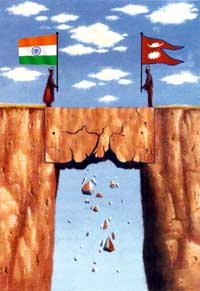 NEW DELHI - Officially, minister Kamal Thapa was in the Indian capital last week to take part in SAARC-related activities. But he kept himself busy doing the spadework for a visit by prime minister Surya Bahadur Thapa here next week.
NEW DELHI - Officially, minister Kamal Thapa was in the Indian capital last week to take part in SAARC-related activities. But he kept himself busy doing the spadework for a visit by prime minister Surya Bahadur Thapa here next week. Interesting that our former ambassador in Delhi and titular head of the foreign ministry, Bekh Bahadur Thapa, has not been entrusted with the job. Could it be that he doesn't seem to be a terribly popular figure among 'Nepal experts' that mill about at the India International Centre who consider Kamal Thapa as the Thapa to watch?
In the time-honoured tradition of every Nepali leader paying his respects at the Dilli Durbar, septuagenarian Surya Bahadur Thapa is going to be a guest of the government of India. It will be New Delhi's defacto recognition of a Narayanhiti-appointed apartchik whom most other political parties in Nepal consider 'unconstitutional'. The SAARC alibi will come in handy. Thapa can rush off from Delhi to other subcontinental capitals and not have to worry about balancing the Delhi visit with a symmetrical jump over the hump to Beijing.
Despite Sino-Indian convergence on global geostrategic matters, our premier may find that vis-?-vis Nepal, South Blockwallahs are still obsessed with the Cold War shibboleth of the 'China Card'. Ties between Beijing and New Delhi haven't been warmer since the mushy days of 'Hindi Chini Bhai Bhai' of the 1950s. This week, Indian and Chinese naval vessels engaged in a joint exercise off Shanghai and an Indian military delegation was in Tibet for confidence-building. Unfortunately, all this doesn't seem to have any impact on a kingdom squeezed between the two giants. Like Lee Kuan Yew said: when two elephants fight the grass is crushed and when they make love the mess is worse.
South Block's Nepal policy is framed with a reference that has ceased to exist-the supposed competition for influence in a buffer zone. With only one hyper-power, it has become the manifest destiny of small states to live in the sphere of influence of regional satraps. Thucidydes' right-is-might maxim has never been truer: "Right is only in question between equals in power, while the strong do what they can and the weak suffer what they must."
The obsessive concern for the foreign policy nababs here are still ISI, Pakistan and the supposed profusion of madarasas in the tarai. The acronym 'ISI' comes up so often at a seminar on 'Indo-Nepal Relationship 2020' that it makes fellow-delegate Hari Sharma quip: "It probably stands for Indian Security Initiative."
Had the assertion been based on ground realities, it would have been possible to discuss details. The fact that IC-813 took off from Tribhuban International Airport four years ago is still cited as clinching proof that Nepal is an ISI hotbed. Some of this hype is repeated so often that Indian officialdom actually believes its own propaganda. Like: "Pakistan has the second-biggest diplomatic mission in Kathmandu after India". Wrong.
The problem with Indo-Nepal relationship is that it isn't interest-based anymore, it is position-based. So, when we meet, we no longer talk to each other, we talk at each other. This is what psychologists call the "enigma of proximity" in international relations between "distant neighbours". Nearness becomes just a measure of distance.
The paradox of "antagonistic cooperation" between neighbours as close as India and Nepal can't hold indefinitely. When India and Pakistan fought in Kargil, more coffins arrived in Nepali villages than in the Indian states of Gujarat or Tamil Nadu. The priority in India-Nepal relationship isn't to come up with some grand security doctrine or even harnessing hydropower for mutual benefit. The overriding concern is to rebuild trust that has been squandered away by our short-sighted decision-makers.
The Gujral Doctrine is now dead and buried. In hindsight, it is easy to recognise that the advantages of that bold experiment far outweighed its costs even to its main actor: the Indian Republic. If India is to claim its rightful place in world affairs, it has to grow out of its pettiness in dealing with smaller neighbours. Benefits that accrue to the bigger player in bilateral bargaining are marginal while there is disproportionate impact on the smaller partner. The resentment of heavy-handedness is etched hard in the memory. The bigger brother may get subservience, but he will not gain respect.
Monetary theory states that in conditions of assymetrical bargaining it is sometimes necessary to find ways to enhance the contractual strength of the weaker bargaining agent. Unfortunately, premier Thapa lacks legitimacy to raise this legitimate concern. That is one of the tragedies of India: none of its neighbours have evolved into stable democracies.



